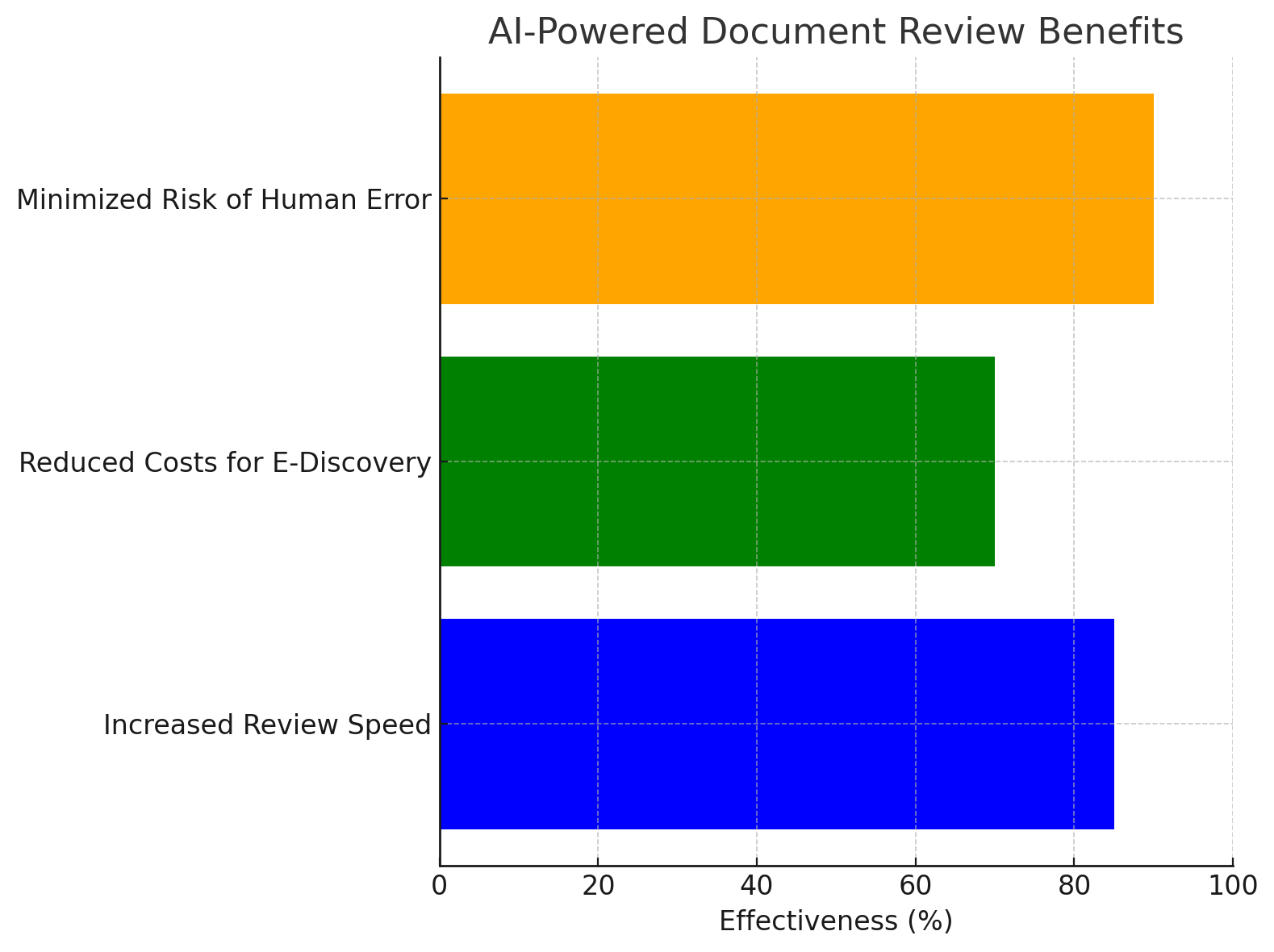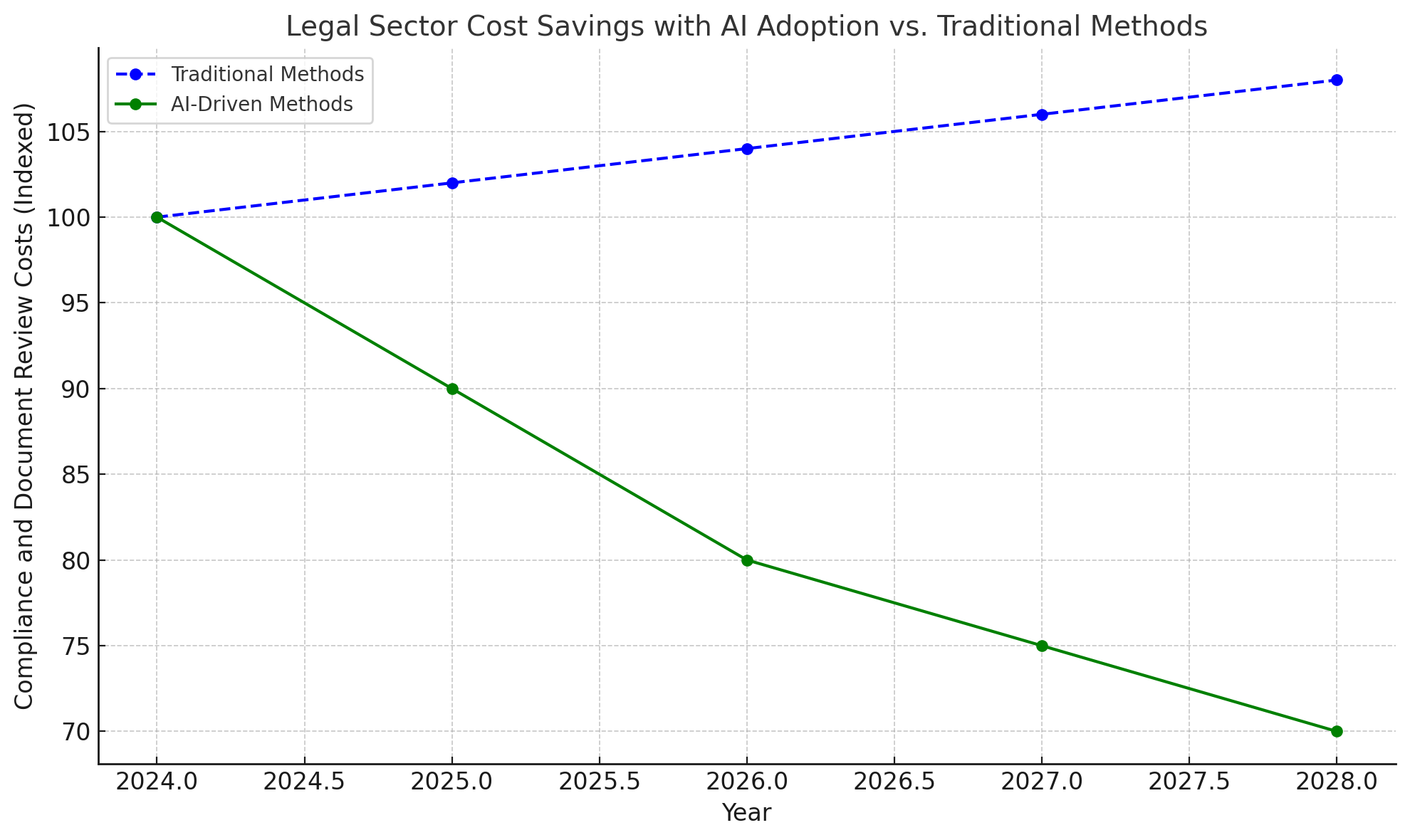In the modern legal landscape, AI technology is becoming increasingly crucial for maintaining efficiency, cutting costs, and ensuring compliance. Law firms that adopt AI-driven solutions can streamline document review, enhance fraud detection, and optimize overall operations—allowing them to better serve their clients and stay competitive. Let’s explore the ways in which AI is transforming the legal industry, especially in the critical areas of compliance and fraud detection.
AI-Powered Document Review and Automation
Document review is one of the most time-consuming and resource-intensive tasks in legal practice. AI technology allows firms to dramatically increase the speed and accuracy of document review. With advanced AI systems, firms can automate e-discovery, quickly identify relevant documents, and analyze vast volumes of data in a fraction of the time it would take a human team.
By implementing AI, firms can cut document review times by up to 50%, leading to faster case resolutions and significant cost savings (McKinsey, “AI in the Legal Sector”). This also reduces the risk of human error and helps ensure compliance with regulatory requirements.
AI-Powered Document Review Benefits:
- Increased review speed and accuracy
- Reduced costs for e-discovery
- Minimized risk of human error

Case-Related AI Insights and Generative AI
AI’s power extends beyond document automation. Generative AI and machine learning tools can be leveraged to uncover patterns in complex litigation, cross-reference evidence, and generate new insights that might otherwise be missed by human teams. These AI tools can assist in identifying key trends and correlations across case materials, providing attorneys with actionable insights that could be game-changing in complex legal cases.
For instance, AI systems can highlight previous rulings, potential inconsistencies, or patterns of behavior that could strengthen a legal argument. This technology provides an unprecedented ability to analyze vast amounts of data, helping lawyers develop better strategies faster and more effectively.
Fraud Detection and Risk Management: Drawing on Proven Innovation
In addition to document review, AI can be applied in fraud detection and compliance management. AI tools can analyze large datasets to identify anomalies and detect patterns of fraudulent activity that may otherwise go unnoticed. This is particularly critical for law firms managing financial and regulatory risk, where accuracy and timeliness are paramount.
My Experience in Fraud Detection:
I have firsthand experience in this area, having developed and patented an AI-based fraud detection system during my work on an invoice financing solution. This system has been recognized with the EU Seal of Excellence, showcasing how AI can be leveraged to identify fraudulent behavior in real-time, providing significant advantages over traditional methods. The patent demonstrates the ability of AI to process complex data sets efficiently, which has direct applications in the legal sector.
For firms dealing with financial risk, AI-driven fraud detection can improve detection accuracy by up to 30%, while simultaneously reducing compliance-related costs by 25-35% (Deloitte, “Fraud and Financial Crime in the Digital Age”). This not only safeguards clients but also positions firms as leaders in compliance and risk management.
System Implementation for Optimization
Law firms must also consider the scalability and integration of AI systems into their existing operations. AI can be seamlessly integrated into case management systems, allowing for smoother operations and more effective resource allocation. By implementing AI tools that streamline case intake, billing, and client communication, law firms can boost their overall efficiency while improving client satisfaction.
This results in lower operational costs and better overall management, enabling firms to focus on high-value legal work instead of getting bogged down by administrative tasks. Implementing AI in operational workflows can lead to up to 40% savings in administrative overhead costs (PwC, “AI in Legal Services”).
The graph below illustrates the projected cost savings that law firms can achieve by adopting AI-driven solutions. It compares traditional compliance and document review costs with those using AI technology, showcasing a substantial reduction in expenses over time. Law firms that integrate AI can expect up to a 30% reduction in compliance costs and a 25-35% reduction in document review costs (Deloitte, “Fraud and Financial Crime in the Digital Age”).

Why Law Firms Should Adopt AI Now
The legal sector faces increasing pressure to remain competitive and cost-efficient. As technology advances, firms that adopt AI-driven solutions will be better positioned to provide faster, more accurate services while cutting costs. From document automation to fraud detection, AI is no longer a futuristic concept—it is a practical tool that law firms must embrace today to ensure long-term success.
Conclusion
The adoption of AI in the legal sector is not just an opportunity; it is a necessity. Firms that integrate AI into their operations can achieve significant cost savings, improve efficiency, and enhance compliance efforts. With AI, law firms can transform the way they operate, providing better service to clients while staying ahead in an increasingly competitive market.
Now is the time for law firms to take advantage of these innovative solutions. The question is not if AI will transform the legal sector—but how soon will you be ready to embrace it?
Also please read How Automation is Reshaping the Future of Work


